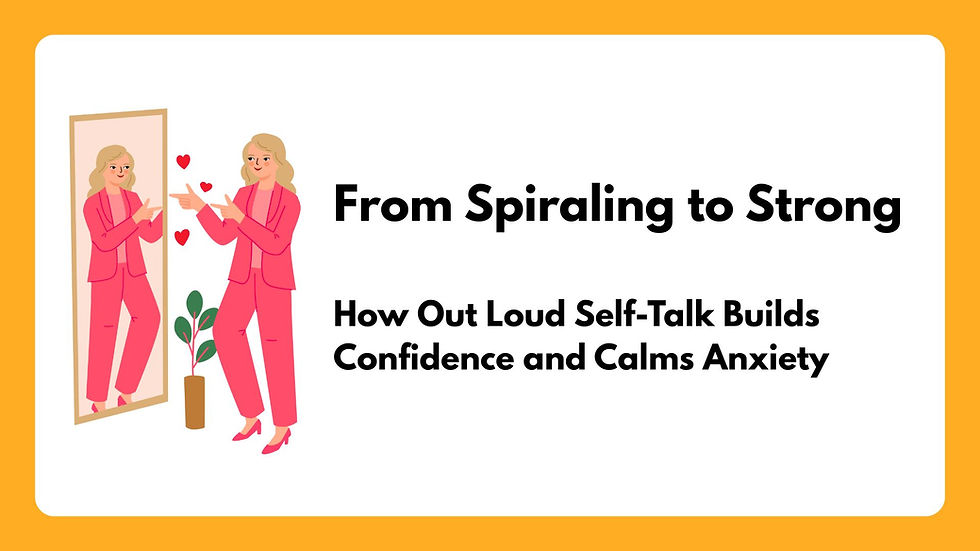How Talking To Yourself Out-Loud Builds Confidence and Reduces Anxiety
- Jenn DeWall
- Jul 23
- 3 min read

Let’s start with the obvious: talking to yourself out loud has gotten a bad rap.
We’ve been conditioned to think it’s weird. Unhinged. A sign you’ve lost it. But science says otherwise: talking to yourself out loud can actually make you a stronger, smarter, and more emotionally intelligent leader.
And if you’re a high-achiever juggling pressure, perfectionism, or people-pleasing? This one’s for you.
The Science Behind Talking to Yourself
According to research from Dr. Ethan Kross (Chatter) and psychologists at institutions like the University of Michigan, talking to yourself out loud—especially using your name or second-person language (“you”)—can dramatically improve performance under stress.
Studies show it can:
✅ Improve emotional regulation
✅ Enhance self-control
✅ Reduce stress and anxiety
✅ Improve decision-making and confidence under pressure
✅ Boost task performance and memory
In one study, participants who used their name while navigating a stressful situation had reduced activity in the amygdala (the brain’s fear center) and performed better on difficult tasks.
And according to Real Simple, talking to yourself out loud even activates more areas of your brain than thinking silently, which means you think clearer, faster, and more effectively.
Why This Matters for Leaders
If you’re managing stress, team dynamics, deadlines, or a never-ending inbox, your internal dialogue is either helping you stay grounded… or making you spiral.
Talking to yourself out loud can be a game-changer—especially when you're overwhelmed, second-guessing, or stuck.
How to Use Self-Talk Out Loud to Build Confidence and Calm Anxiety
Here are 5 practical ways to build confidence and overcome anxiety with out-loud self-talk.
1. Coach Yourself with Your Name
Instead of saying “I can’t do this,” try:
“Jenn, you’ve done harder things. You can handle this.” This creates emotional distance, calms the brain, and builds trust in yourself.
2. Talk Yourself Through the Task
Stuck? Say what you’re doing out loud:
“Okay, first I’m going to reply to these emails. Then I’ll prep for the meeting.” This reduces cognitive overload and helps you focus—especially during high-stress days.
3. Name the Emotion Out Loud
Overwhelmed? Try:
“I’m feeling anxious because I’m behind. That makes sense.” Research shows that labeling your emotions out loud can reduce their intensity and activate the brain’s self-regulation centers.
4. Reframe the Critic into a Coach
If you mess up, don’t spiral silently. Say:
“That wasn’t ideal, but it doesn’t mean I’m failing. Here’s what I’ll do differently.” The goal isn’t perfection—it’s progress.
5. Use it to Interrupt a Burnout Spiral
When you’re doom-scrolling or stress-eating, try:
“You’re numbing out. Let’s go take a walk or drink some water instead.” It might feel silly, but it works.
Bottom Line: Your Words Shape Your World—Use Them Out Loud
Talking to yourself out loud isn’t weird—it’s one of the simplest, science-backed tools to stay calm, confident, and in control.
So the next time you’re spiraling? Don’t just think your way through it. Say something.
Because sometimes leadership sounds like:
“You’ve got this.” “Take a breath.” “One thing at a time.” “We’re figuring it out.”
You’re already talking to yourself anyway—make it something worth hearing.
Looking for a speaker to help your team overcome burnout and build stronger mindsets at work? Let's talk. I speak and coach on these topics—with science, humor, and relatable examples. Let’s talk.



Comentários